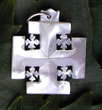Palestinian Handicraft - done by the women
Olive
wood - Olive
wood carvings are made from the branches of local olive trees which are
pruned at the completion of the olive picking season. In addition to the
handmade quality of the item, the grain of the wood gives each piece a
special character. The West Bank towns of Bethlehem, Beit Sahour and Beit
Jala specialized in olive wood crosses, nativity sets and statues. More
recently carvings of camels, horses and donkeys have been produced.
Olive wood carving can be traced back to the 16th and 17th centuries.
Travelers' accounts and historical documents describe the beauty of olive
wood rosaries and crucifixes and their popularity among pilgrims. Sunbula
works with a number of artisan olive wood groups in Bethlehem and Beit
Sahour.
Mother-of-Pearl
- Mother-of-Pearl carving is a tradition
that can be traced back to the early 17th century. It evolved as an art
form along with olive wood carving when Franciscan monks came to the Holy
Land. The monks trained the local Christian population in the carving
of olive wood and mother-of-pearl rosaries, crucifixes and reproductions
of the Cave of the Nativity and the Church of the Holy Sepulcher. Mother-of-pearl
is usually imported from Saudi Arabia.
Tahriri (Couching Stitch) - "The main technique of Bethlehem embroidery is couching with silver, gold and silk cord. This is twisted into elaborate floral and curvilinear patterns, attached to the fabric with tiny stitches, and framed and filled with herringbone and satin-stitches in vividly colored silks." From: S. Weir, Palestine Costume.
Tahriri was
used to make the front panels of wedding dresses and also the side panels
of the skirts and the cuffs of the long traditional dresses. The technique
may have been inspired by ornate church ornaments, liturgical clothing
or the braid and couching ornamentation on the uniforms of Ottoman and
British officers. Sunbula sells dress front panels, evening bags, cushion
covers, runners, belts and many other beautiful items in the tahriri stitch.
Olive oil soap - Palestinians are as particular about their choice of olive oil as the French or Italians are about their wines. The oil from Ramallah is light and a little bitter, while oil from Beit Jala is heavier and bitter like freshly pickled olives. Most oils in the area are the result of the first cold pressing.
The Palestinian town of Nablus was known throughout the Middle East for its large-scale production of olive oil soap. In homes older women are traditionally in charge of making olive oil soap - a difficult labour.
Sindyanna of Galilee, established in 1996 as a non-profit fair-trade marketing company, produces high quality olive oil and olive oil soap. Sunbula offers two types of olive oil soap, a large bar of Galilee Sindyanna soap and a smaller bar from Nablus. Both are suitable for the most delicate skin and hair.




Jerusalem cross..


